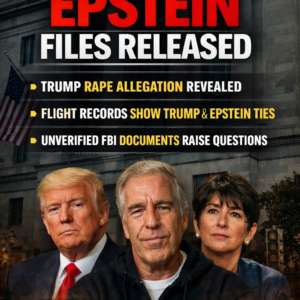Habari News Analysis | By Damon Ellison
After months of berating reporters, mocking critics, and dismissing questions about Jeffrey Epstein as “nonsense,” “attacks,” and even calling journalists “piggy” for raising the issue, President Donald Trump has taken a sudden and dramatic turn: he signed the bill authorizing the release of the Epstein files.
On paper, this should mean sweeping transparency on one of the most infamous criminal networks in modern American history. But the reality is far less certain — and the political maneuvering behind the scenes raises serious questions about whether the files will actually see daylight.
A Stunning Reversal After Months of Denials
For most of the year, Trump treated any mention of Epstein as a political assault. He has repeatedly lashed out at reporters who asked about the files, insisting the topic was a distraction, not a priority.
Yet last week, he abruptly announced that he had signed the bipartisan legislation requiring the release of the documents — a bill that cleared the House and Senate with overwhelming support. The White House framed it as a commitment to “maximum transparency,” but Trump’s tone has hardly suggested enthusiasm.
Instead, the shift looks less like transparency and more like political damage control.
The Pam Bondi Factor: “New Information Has Come In”
Complicating matters further is Attorney General Pam Bondi’s statement just hours before Trump made his announcement.
Bondi confirmed to ABC News that the Justice Department had received “new information” regarding the Epstein files, suggesting that additional leads or potential witnesses may require further investigation. She did not elaborate on the source or credibility of the information.
Critics fear this opens the door to delays, selective releases, heavy redactions, or even indefinite withholding, despite Trump signing the bill.
Under the law, the DOJ is explicitly allowed to withhold or redact identities, including:
-
Names of individuals who may face danger
-
Personal identifying details
-
Information tied to ongoing investigations
Those exceptions are broad — and in Washington, broad exceptions often become escape hatches.
My POV: I Don’t Think the Files Are Coming Out Anytime Soon
I could be wrong — and I hope I am — but the timing and the turnaround do not sit right.
For months, Trump treated the Epstein questions with hostility, calling people names, screaming at reporters, and acting as though the subject was beneath him. Then suddenly, in the middle of political heat, he signs the bill and declares himself the champion of transparency?
Trump has a track record. We’ve seen this pattern before:
-
Big promises.
-
Loud declarations.
-
Dramatic reversals.
-
And finally… nothing.
The earned nickname “Trump always chickens out” didn’t come from thin air.
The speed of this pivot — paired with Bondi’s conveniently timed “new information” — feels less like transparency and more like a strategic stall. Signing the bill gives him political cover, while the DOJ loopholes give him the ability to slow-walk the actual release.
Why the Files Matter
The Epstein files are expected to include:
-
Unsealed depositions
-
Correspondence
-
Visitor logs
-
Testimony from victims
-
Names of individuals connected to Epstein’s operations
Both parties have reason to be nervous. High-profile figures across politics, business, academia, and entertainment have been linked to Epstein socially or professionally, even if not criminally.
Public pressure has only grown as survivors continue to demand accountability.
A Bipartisan Vote — and a Bipartisan Concern
The bill passed Congress with large bipartisan support, an increasingly rare occurrence in today’s polarized climate. Lawmakers from both parties argued that transparency is the only path to restoring public trust.
But many on Capitol Hill share the same question I do:
If Trump didn’t want these files out before, why the 180-degree turn?
Is he trying to get ahead of damaging leaks?
Is he hoping the “new information” buys his team time?
Or is this just political theater designed to change headlines?
What Happens Next
The Justice Department now faces a clock. By statute, the files are supposed to be released within a firm timeline — but redactions, delays, and “ongoing investigation” claims could easily push back the release for months or even years.
Congress does have oversight power and could hold hearings if the DOJ drags its feet.
For now, the public waits — again.
Bottom Line
Trump signed the bill.
But signing the bill isn’t the same as releasing the files.
And given the president’s long history of last-minute reversals, political posturing, and strategic noise-making, there’s every reason to be skeptical.
Until those documents are in the public’s hands, nothing is guaranteed.











More Stories
DHS Launches Landmark USCIS Fraud Investigation in Minnesota
Investigative Report: Voucher Fraud, Ghost Students, and the Real Cost of Arizona’s ESA Program
Trump’s Return to Power in 2025: A Year Defined by Executive Orders, Emergencies, and Escalating Culture Wars